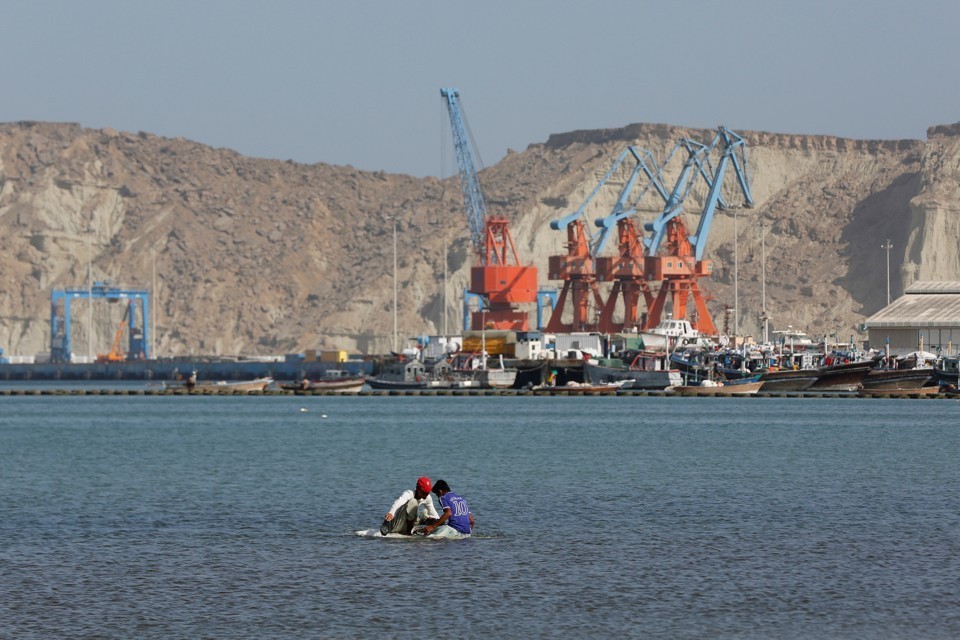Media Report

- The Atlantic comments: "The Pakistani town of Gwadar was until recently filled with the dust-colored cinderblock houses of about 50,000 fishermen... Now it's one centerpiece of China's "Belt and Road" initiative, and the town has transformed as a result... China is quickly growing into the world's most extensive commercial empire. By way of comparison, after World War II, the Marshall Plan provided the equivalent of $800 billion in reconstruction funds to Europe (if calculated as a percentage of today's GDP). In the decades after the war the United States was also the world's largest trading nation, and its largest bilateral lender to others... Unlike the United States and Europe, China uses aid, trade, and foreign direct investment strategically to build goodwill, expand its political sway, and secure the natural resources it needs to grow. Belt and Road is the most impressive example of this. It is an umbrella initiative of current and future infrastructure projects. In the next decades, China plans to build a thick web of infrastructure around Asia and, through similar initiatives, around the world... Perhaps the biggest challenge China's efforts pose to the "liberal international order" is that, in contrast to most Western aid and loans, Belt and Road projects often encourage terrible governance, environmental, and human rights standards, although China's record on this has improved somewhat over the past few years."
- The New York Times reports: "When Xi Jinping strode out in the Great Hall of the People five years ago as China's new leader, his tight smile barely hid the atmosphere of smoldering crisis. The Communist Party elite had been battered by infighting and scandals involving power grabs, bribery and even murder. Military commanders and state security chieftains — the guardians of one-party rule — had grown grossly corrupt. Critics openly accused Mr. Xi's predecessor, Hu Jintao, of dithering as popular ire spread. On Wednesday, Mr. Xi opened another Communist Party congress, this time as the nation's most powerful leader in decades, all but certain to receive a second five-year term. And after spending his first term tightening control on society, he is expected to enshrine his authoritarian vision for revitalizing the party — and perhaps position himself as indispensable to its survival... With his two most recent predecessors as Chinese leader, Mr. Hu and 91-year-old Jiang Zemin, in attendance, Mr. Xi told his audience that under him Chinese socialism was entering a 'new era.'''
- The Washington Post reports: "By the time you read this, one of the most important global political events of the next five years — if not longer — will have begun: the 19th National Congress of the Chinese Communist Party. The event may sound obscure to those uninterested in Sinology. It's not. Beginning on Wednesday and expected to last for about a week, the event brings together 2,300 Communist Party members from across China. It's where the party will select its leadership — and with it, its policies — for the next five years. Given China's huge population, economy and military strength, the 19th National Congress could set the agenda not only for Beijing, but also for much of the world. Most observers predict that the congress will put power increasingly in the hands of one man: Xi Jinping. Xi became the leader of China after its last party congress in 2012, and this year's edition will almost assuredly hand him a second five-year term, which has become near-automatic for Chinese leaders. But some think that Xi is setting himself up to spend a far longer time holding the reins of power... But observers point to a number of worrying signs that what Xi doesn't want is an increasingly open China. Instead, they think, he seeks a totalitarian quashing of dissent."
Calendar
- 2017-10-17 China's Communist Party is holding its most important meeting in years: Here's what you need to know
- 2017-10-16 China stands at 'a new historic starting point,' Communist Party says
- 2017-10-15 China's Pollution Crackdown Is Gaining Momentum
- 2017-10-13 China’s trade with North Korea slumps as nuclear sanctions finally start to bite
- 2017-10-12 Big twice-in-a-decade meeting in China may have a curious market impact
- 2017-10-11 China treats its foreign aid like a state secret. New research aims to reveal it.
- 2017-10-10 Chinese yuan strengthens in a sign of 'overriding stability' ahead of the key 19th Communist Party Congress
- 2017-10-09 1.34 million officials have been punished for graft since 2013, Chinese watchdog says
- 2017-10-06 U.S. defers China aluminum foil dumping decision
- 2017-10-05 High-level US-China Talks Focus on Immigration, Fugitives
News
- The New York Times Xi Jinping Opens China's Party Congress, His Hold Tighter Than Ever
- The Washington Post Why the world is watching Xi Jinping and China's party congress
- CNBC Xi Jinping makes big promises for China's economic future
- Quartz In China, there's nothing like a dry three-hour Xi Jinping speech to get the party going
- Bloomberg Xi Skips Old Growth Pledge as China Seeks Quality, Not Quantity
- BBC News Xi Jinping: 'Time for China to take centre stage'
- Financial Times China anti-corruption purge hits Central Committee members
- BBC News The human cost of China's economic reforms
- CNBC Three ways to make money out of China, according to one investor
- Financial Times China third-quarter GDP: 4 things to watch
- CNBC 1 billion could be using 5G by 2023 with China set to dominate
Commentary
- The Atlantic China Is Quietly Reshaping the World
- Bloomberg China Isn't Fixing Its Flaws
- Foreign Policy Is India Starting to Flex Its Military Muscles?
- NPR How Will China Select Its New Leaders At Its Communist Party Congress?
- Forbes China's Challenges Abroad: How Do You Solve A Problem Like North Korea?
- Los Angeles Times China once welcomed refugees, but its policies now make Trump look lenient
- Forbes China's Best Social Media And Internet Stocks
